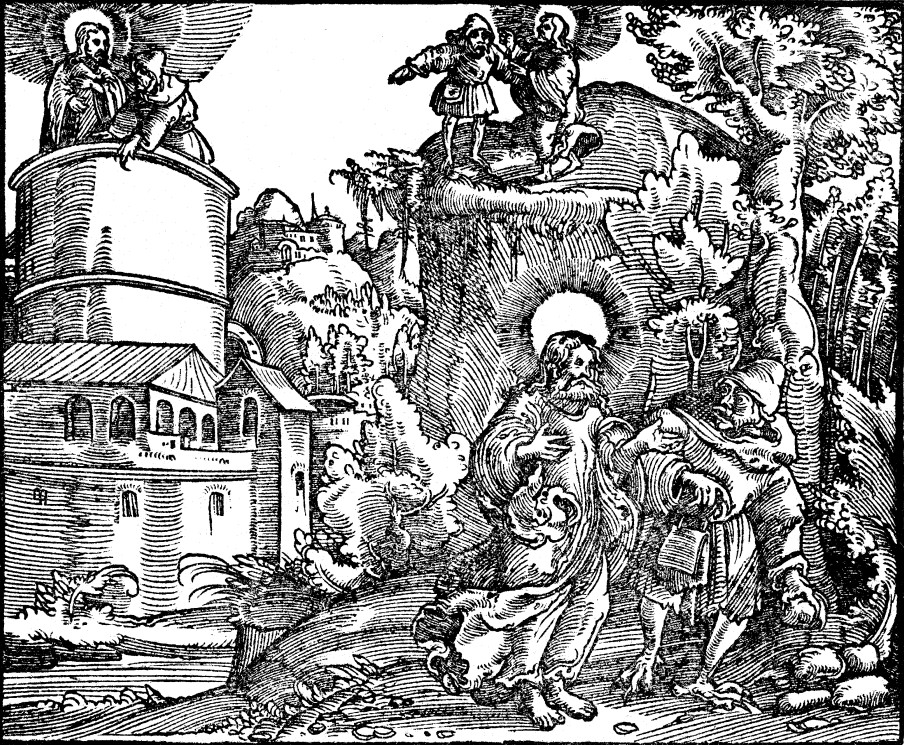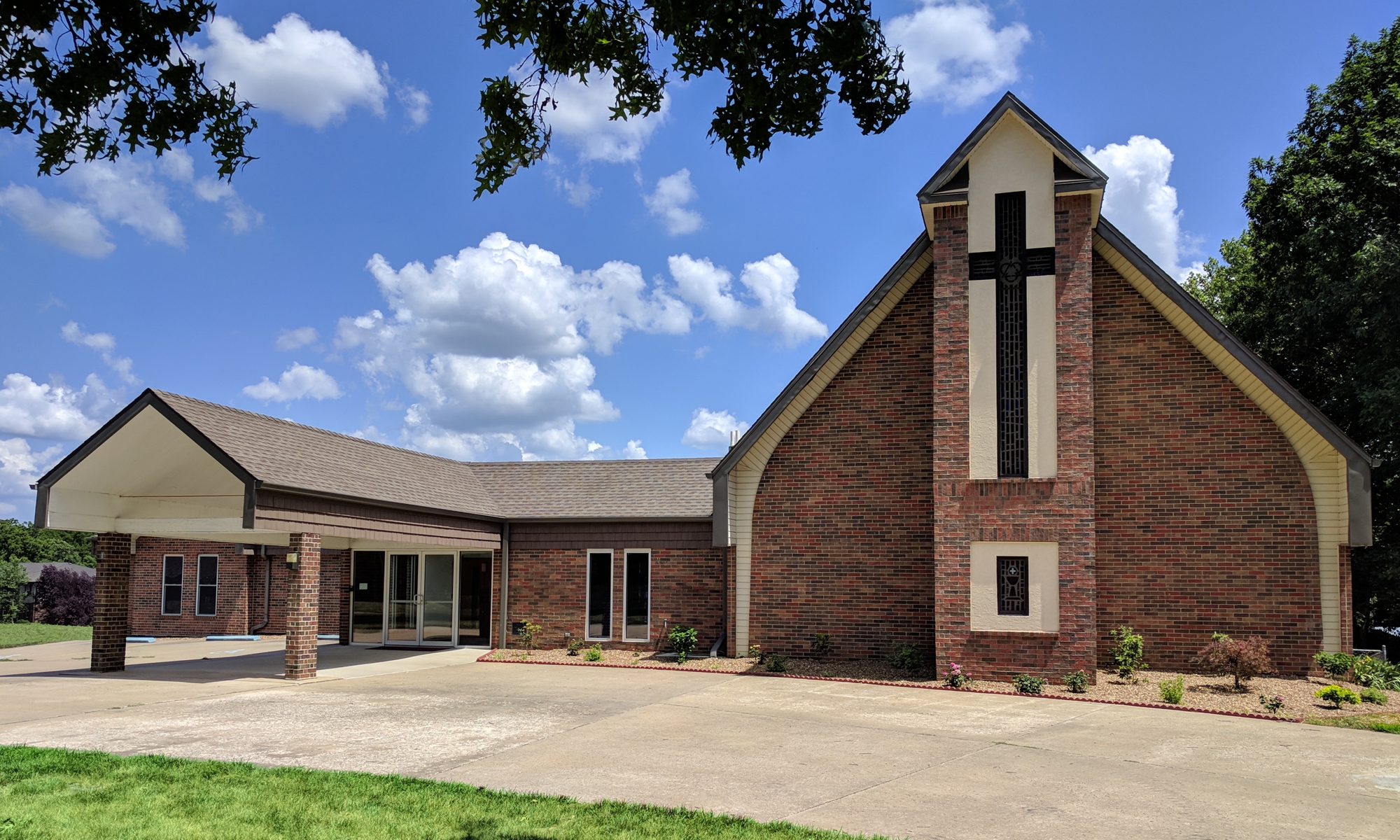
Lessons: Genesis 3:1-21, 2 Corinthians 6:1-10, Matthew 4:1-11
Hymns: LSB 569, 656, 422, 438, 561, 716
Grace, mercy, and peace to you from God our Father and our Lord and Savior, Jesus Christ. Amen.
Imagine a world with no pain, no suffering, no death. A world with no crime, no abuse, no violence. A world with no discrimination, no hatred, no classes. A world with no wars, no oppression, no revenge. A world with no neglected children, no broken homes, no dysfunctional families. A world with no disease, no cancer, no depression. A world with no hurricanes, no tornadoes, no tsunamis. A world with no weeds, no decay, no toil. A world that needs no prisons, no hospitals, no nursing homes. A world that only knows well-behaved children, perfect families, and people who live forever without suffering.
Our world—this planet—was once that way. God created the world that way. It was good. It was perfect. And everything in His creation was good and perfect. Truly God’s creation—made out of nothing by the voice of God—was good. Man was made in the image of God—perfect, holy, and knowing God as He is. Sin did not corrupt the world. Sin did not even exist in the world. This world was Paradise.
But a great conflict occurred in Paradise. A powerful angel that God created rebelled. There was no place in Heaven for such rebellion. Satan was cast to the earth and his angels were cast out with him. And a tree was placed in the center of the Garden of Eden. A tree whose fruit Adam was told to never eat. A tree that was placed as a test. A tree that would determine if Adam and Eve would remain faithful to God and live in Paradise forever, or if they would destroy the world by eating of that fruit.
Satan tempted Eve. He lied to her. He questioned God. “Did God really say?” “Did He really mean it?” “Could it really be true that you would die?”
The fruit looked so good. And so, she ate. Adam did not stop her; he ate as well. All hell broke loose. Their sinful act brought sin into the world. No longer was the earth perfect. No longer would there be no death. No longer would there be no suffering.
For the sin that Adam and Eve brought into the world means corruption. Sin means imperfection. Sin means death.
Because of his sin, Adam lost the image of God. No longer was he perfect. No longer was he holy (Eph. 4:24). No longer did he know God (Col. 3:10). No longer could he see God as He is (1 John 3:2).
And God’s wrath was upon him. The wage for his sin was death—eternal damnation (Rom. 6:23). He earned for himself nothing but condemnation. His righteousness was nothing but filthy rags (Is. 64:6). His ways were evil. His deeds were wicked. Because he sinned, there was no glimmer of good in him. Sin so permeated man that there was no saving quality whatsoever in him.
Adam passed this sinful human nature down to his children. His firstborn son was a murderer, killing his own brother, hating God, and bringing shame and death to the family. You see, Cain was born in the likeness of Adam—a sinner, thoroughly corrupt, evil and wicked—by nature enmity against God, hating God and all things good; loving the sinful flesh, the fallen world, and all things evil.
Man has not improved since then. That same corruption is passed on. The same destruction, the same sin, the same hatred, the same inclination to wickedness—all of this is passed on from the man to his children. We call it original sin. We are brought forth in iniquity (Ps. 51:5). “The wicked are estranged from the womb; they go astray from birth, speaking lies” (Psalm 58:3). “Surely there is not a righteous man on earth who does good and never sins” (Eccl. 7:20). “All have sinned and fall short of the glory of God” (Rom 3:23).
The Lutheran Confessions state, “That original sin in human nature is not only a total lack of good in spiritual, divine things, but that at the same time it replaces the lost image of God in man with a deep, wicked, abominable, bottomless, inscrutable, and inexpressible corruption of his entire nature in all its powers, especially of the highest and foremost powers of the soul in mind, heart, and will. As a result, since the Fall, man inherits an inborn wicked stamp, an interior uncleanness of the heart and evil desires and inclinations. By nature every one of us inherits from Adam a heart, sensation, and mindset which, in its highest powers and the light of reason, is by nature diametrically opposed to God and his highest commands and is actually enmity against God, especially in divine and spiritual matters. True, in natural and external things which are subject to reason man still possesses a measure of reason, power, and ability, although greatly weakened since the inherited malady has so poisoned and tainted them that they amount to nothing in the sight of God” (FC, SD I, 11-12).
What, then, do we have to offer God? We have ruined the world. We have corrupted it. We have brought death into this world.
Can we offer Him our good intentions? No, for He demands perfection (Matt. 5:48). Can we offer Him our good works? No, for “to him who works, the wages are not counted as grace but as debt” (Rom 4:4 NKJV). Can we offer Him our hearts? No, “For from within, out of the heart of man, come evil thoughts, sexual immorality, theft, murder, adultery, coveting, wickedness, deceit, sensuality, envy, slander, pride, foolishness. All these evil things come from within, and they defile a person” (Mark 7:21-23).
We are so thoroughly corrupted that “None is righteous, no, not one; no one understands; no one seeks for God. All have turned aside; together they have become worthless; no one does good, not even one” (Rom. 3:10-13).
God is righteous and righteously judges the sinner. Every human—young and old—is condemned according to his flesh. On our own accord, there is no way around it. We absolutely cannot make satisfaction for sin. There is nothing we can do to contribute to our salvation. We cannot even choose God (John 15:16).
But He chose us. He chose us that we should go and bear fruit. “He chose us in him before the foundation of the world, that we should be holy and blameless before him. In love he predestined us for adoption to himself as sons through Jesus Christ, according to the purpose of his will, to the praise of his glorious grace, with which he has blessed us in the Beloved” (Eph. 1:4-6).
Before Adam and Eve were removed from the Garden of Eden—before they were booted from Paradise—God gave them a Promise. He spoke to Satan before their eyes and told Satan that a Man will crush the head of Satan, disarming him of his power, destroying his destruction, and granting eternal salvation to all who believe (Gen. 3:15). This Man came into the world. This Man was born some 2,000 years ago. God Himself elected the Valiant One who fights for us. “Ask ye, Who is this? Jesus Christ it is, of Sabaoth Lord, And there’s none other God; He holds the field forever” (LSB 656:2).
Christ Jesus was sent into the world to destroy Satan, to forgive the sins of the penitent, to open the gates of heaven, and to usher those whom the Lord calls to be with Him forever.
This Man, Jesus Christ, was born of the woman, born of the virgin. He knew no sin and committed no sin (2 Cor. 5:21). He was perfect.
His Father is God the Father. He was conceived by the Holy Spirit. He did not inherit corruption like we did. He carried out His Father’s will perfectly. He was obedient, even to the point of death (Phil. 2:8). When He was tempted, He faithfully withstood the attacks of Satan. When He was doubted, He did not give up. When He was rejected, despised, and acquainted with grief, He did not fold. When He was tried and beaten, He submitted to the punishment. When He was nailed to the tree, He submitted to His Father’s will.
Unlike us, Jesus did not deserve death. He did nothing wrong. But God demanded that blood be shed. He insisted that our salvation be earned. He sent His Son to be punished in our place. He decreed that Christ Jesus will pay the full penalty for our sins, serving as our ransom, giving up His life, and dying for us. In this, Jesus destroyed death. Jesus crushed the head of Satan. He defeated the enemy when He died—forsaken by God—hated by His enemies. He washed our sins away. He buried our transgressions. He took away the sins of the world on that Good Friday.
He did not stop there, but He rose from the dead on the third day. He guaranteed our salvation, He gave us eternal life, He justified us, He pronounced us innocent. He righteously judges us—justified, not guilty.
We’re still sinners here. We still suffer the effects of sin. We still pass on our thoroughly corrupt, sinful human nature to our children.
But Christ has declared us to be acceptable to heaven, He has chosen us in Him, He has redeemed us with His blood, He has paved the way for everlasting life. God has baptized us into His family, adopting us as His children.
And on the Last Day, God will raise all the dead. He will grant to all believers in Christ eternal life. He will give them a perfect body. He will make new heavens and a new earth. They will live in Paradise with the Father, Son, and Holy Spirit to all eternity. He will make all things new. The perfect world that I described? That is what is in store for us! This is God’s promise. It is our hope. It is God’s saving truth—His Good News for you! Thanks be to Jesus for redeeming us, for dying for us, for pleading for us, and for granting us life. Amen.
The peace of God which passes all understanding keep your hearts and minds in Christ Jesus to life everlasting. Amen

